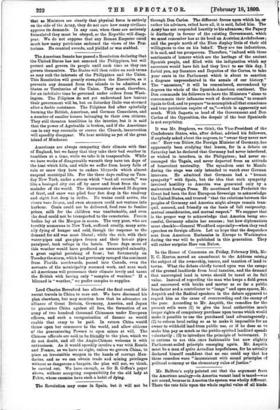In the House of Commons. on Friday. February 10th, Mr.
E. C. Morton moved an amendment to the Address raising the subject of the ownership, tenure, and taxation of land in towns. What the debate chiefly turned upon was the escape of the ground landlords from local taxation, and the demand that unoccupied land in towns should be taxed at its full value. Instead of regarding the man who keeps a field green and uncovered with bricks and mortar as so far a public benefactor and a contributor to " lungs " and open spaces, Mr. Asquith and the Radical speakers in the debate appeared to regard him as the cause of overcrowding and the enemy of the poor. According to Mr. Asquith, the remedies for the present evils were (1) to give the local authorities much larger rights of compulsory purchase upon terms which would make it possible to use the purchased land advantageously ; (2) to reform local rating so as to make it impossible for an owner to withhold land from public use, or if he does so to make him pay as much as the public-spirited landlord spends voluntarily ; (3) to introduce the principle of betterment. It is curious to see this once fashionable but now slightly Parliament-soiled principle emerging again. Mr. Asquith must be a man of quite Arcadian hopefulness, for he actually declared himself confident that no one could say that his three remedies were "inconsistent with sound principles of political economy or the elementary rules of justice."






































 Previous page
Previous page